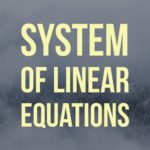Find a Polynomial Satisfying the Given Conditions on Derivatives

Problem 87
Find a cubic polynomial
\[p(x)=a+bx+cx^2+dx^3\]
such that $p(1)=1, p'(1)=5, p(-1)=3$, and $ p'(-1)=1$.
Sponsored Links
Solution.
By differentiating $p(x)$, we obtain
\[p'(x)=b+2cx+3dx^2.\]
Thus the given conditions are
\begin{align*}
p(1)&=a+b+c+d=1\\
p'(1)&=b+2c+3d=5\\
p(-1)&=a-b+c-d=3\\
p'(-1)&=b-2c+3d=1.
\end{align*}
We want to solve these four equations for $a,b,c,d$. So $a,b,c,d$ are unknowns and we regard the conditions as a system of four linear equations.
We solve the system using Gauss-Jordan elimination.
The augmented matrix for the system is
\[\left[\begin{array}{rrrr|r}
1 & 1 & 1 & 1 &1 \\
0 & 1 & 2 & 3 & 5 \\
1 & -1 & 1 & -1 & 3 \\
0 & 1 & -2 & 3 & 1 \\
\end{array}\right] \]
We apply the elementary row operations as follows.
\begin{align*}
&\left[\begin{array}{rrrr|r}
1 & 1 & 1 & 1 &1 \\
0 & 1 & 2 & 3 & 5 \\
1 & -1 & 1 & -1 & 3 \\
0 & 1 & -2 & 3 & 1 \\
\end{array}\right]
\xrightarrow{R_3-R_1}
\left[\begin{array}{rrrr|r}
1 & 1 & 1 & 1 &1 \\
0 & 1 & 2 & 3 & 5 \\
0 & -2 & 0 & -2 & 2 \\
0 & 1 & -2 & 3 & 1 \\
\end{array}\right]
\xrightarrow{\substack{R_1-R_2 \\ R_3+2R_2\\R_4-R_2}}\\[6pt]
&\left[\begin{array}{rrrr|r}
1 & 0& -1 & -2 &-4 \\
0 & 1 & 2 & 3 & 5 \\
0 & 0 & 4 & 4 & 12 \\
0 & 0 & -4 & 0 & -4 \\
\end{array}\right]
\xrightarrow[\frac{-1}{4}R_4]{\frac{1}{4}R_3}
\left[\begin{array}{rrrr|r}
1 & 0& -1 & -2 &-4 \\
0 & 1 & 2 & 3 & 5 \\
0 & 0 & 1 & 1 & 3 \\
0 & 0 & 1 & 0& 1 \\
\end{array}\right]
\xrightarrow{\substack{R_1+R_4 \\ R_2-2R_4\\R_3-R_4}}\\[6pt]
&\left[\begin{array}{rrrr|r}
1 & 0& 0 & -2 &-3 \\
0 & 1 & 0 & 3 & 3 \\
0 & 0 & 0 & 1 & 2 \\
0 & 0 & 1 & 0& 1 \\
\end{array}\right]
\xrightarrow{R_3 \leftrightarrow R_4}
\left[\begin{array}{rrrr|r}
1 & 0& 0 & -2 &-3 \\
0 & 1 & 0 & 3 & 3 \\
0 & 0 & 1 & 0& 1 \\
0 & 0 & 0 & 1 & 2 \\
\end{array}\right]\\[6pt]
& \xrightarrow{\substack{R_1+2R_4 \\ R_2-3R_4}}
\left[\begin{array}{rrrr|r}
1 & 0& 0 & 0 & 1 \\
0 & 1 & 0 & 0 & -3 \\
0 & 0 & 1 & 0& 1 \\
0 & 0 & 0 & 1 & 2 \\
\end{array}\right].
\end{align*}
The last matrix is in reduced row echelon form. Thus the solution to the system is
\[a=1, b=-3, c=1, d=2.\]
Therefore, the polynomial is
\[p(x)=1-3x+x^2+2x^3.\]
 Add to solve later
Add to solve later
Sponsored Links















